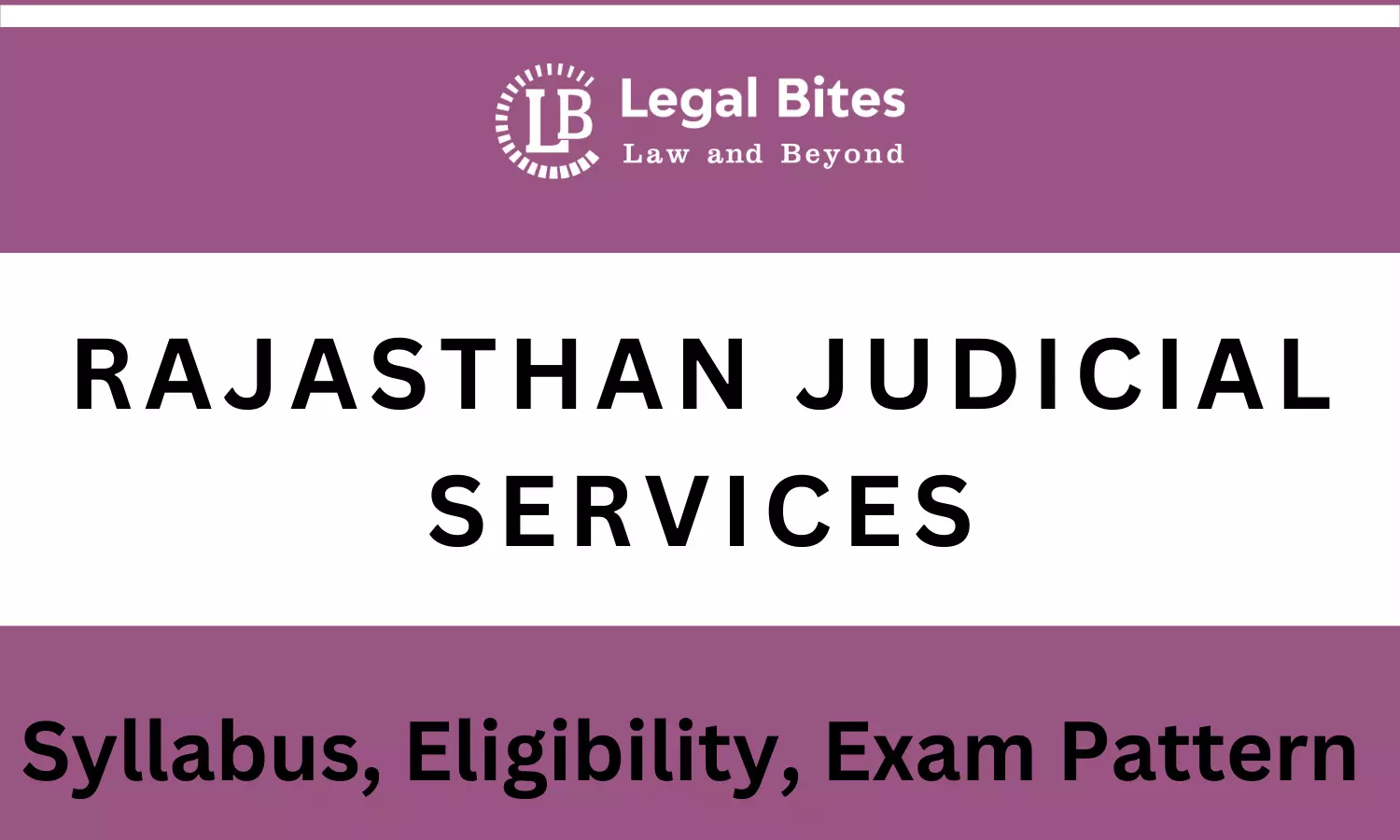Rajasthan Judicial Services Exam | Syllabus, Eligibility, and Exam Pattern
Complete details related to Rajasthan Judicial Services Exam such as eligibility criteria, age limit, exam pattern, and syllabus.

Complete details related to Rajasthan Judicial Services Exam such as eligibility criteria, age limit, exam pattern, and syllabus.
Rajasthan Judicial Services Exam – Syllabus, Eligibility, and Exam Pattern
Rajasthan Judicial Service Examination is conducted every year by the Rajasthan High Court for recruitment to posts of the Civil Judge cadre of the RJS. The exam is conducted by Rajasthan Public Service Commission.
Examination is the entry-level exam for law graduates to become appointed as members of the subordinate judiciary. The members are appointed by the state government under the supervision of the respective high court. The members are appointed based on the Judiciary exam.
Eligibility
Candidates should have a degree of Bachelor of Laws (Professional) from any University in India, which is recognized as such under the Advocates Act, 1961)
Candidates should be thoroughly knowledgeable about Rajasthani Dialects and Social Customs.
Reservation: Only those reserved category candidates are eligible for reservation who is a permanent resident of Rajasthan State. Reserved Category candidates from other states will be treated as an unreserved category.
Exam Pattern – Rajasthan Judicial Services Exam
The exam for recruitment to the cadre of Civil Judges will have three distinct phases:
- Preliminary Examination (Objective Type Multiple Choice)
- Written Main Examination (Subjective / Essay type)
- Interview/Viva-voce (Personal Assessment)
Preliminary exam
- This will be an objective type exam.
- 70% weightage will be given to the subjects prescribed in the syllabus for Law Paper-I and Law Paper-II
- 30% weightage shall be given to test proficiency in Hindi and English language
- Maximum marks – 100 | Time – 2 Hours
- No negative marking for wrong answers / unanswered questions
- The marks obtained in the Preliminary Examination are not counted toward the final ranking
Mains Exam
Mains exam consists of three papers as explained below:
Law Paper I: 100 marks: 3 Hours
Law Paper II: 100 marks : 3 Hours
Language: Paper-I Hindi Essay (50 marks: 2 Hours) | Paper-II English Essay (50 marks: 2 Hours)
Syllabus
The objective type multiple choice questions for the Preliminary Examination shall be from the syllabus prescribed for the Main Written Examination.
The candidates shall be expected to have a general and basic overview of the main subjects and also the ability to answer questions on current events of National and International importance, Indian legal and constitutional history, and governance. The candidates shall also be tested for their analytical skills reasoning and aptitude. The standard of questions shall be of graduate level.
Syllabus for Preliminary Exam
Main Subjects of Law- As prescribed for the Law Papers I & II for the Main Examination
- Hindi Proficiency
- English Proficiency
Hindi Proficiency
शब्द रचना: संधि एवं संधि विच्छेद, समास , उपसर्ग , प्रत्यय
शब्द प्रकार: (क) तत्सम, अर्ध्दतत्सम, तत्भव, देशज, विदेशी (ख) संज्ञा, सर्वनाम, विशेषण, क्रिया, अव्यय (क्रिया विशेषण, संबंध सूचक, विस्मयबोधक निपात)
शब्द ज्ञान : पर्यायवाची, विलोम, शब्द युगमो का अर्थ भेद, वाक्यांश के लिए सार्थक शब्द, समश्रुत भिन्नार्थक शब्द, समानार्थी शब्दों का विवेक, उपयुक्त शब्द चयन, संबंधवाची शब्दावली
शब्द शुद्धि |
व्याकरणिक कोटियाँ: परसर्ग, लिंग, वचन, पुरुष, काल, वृत्ति (mood), पक्ष (aspect), वाच्य (voice)
वाक्य रचना
वाक्य शुद्धि
विराम चिन्हों का प्रयोग |
मुहावरे/ लोकोक्तियाँ |
पारिभाषिक शब्दावली: प्रशासनिक, विधिक (विशेषतः)
English Proficiency
- Tenses
- Articles and Determiners
- Phrasal Verbs and Idioms
- Active & Passive Voice
- Co-ordination &, Subordination
- Direct and Indirect Speech
- Modals expressing various concepts – (Obligation, Request, Permission. Prohibition. Intention. Condition, Probability, Possibility, Purpose. Reason. Companions, Contrast)
- Antonyms and Synonyms.
Syllabus for Mains Examination (Written)
The object of the examination is to test the practical ability of the candidates rather than the range of their theoretical knowledge. For this purpose, the kind of questions that will be asked will be to give the facts of a typical case and ask the candidate to frame issues, to write a judgment, and to discuss the admissibility of evidence.
The syllabus for each paper is as below:
I. Law Paper I
- Code of Civil Procedure, l908,
- The Constitution of India,
- Indian Contract Act,1872,
- The Indian Evidence Act,1872,
- The Limitation Act, 1963,
- The Specific Relief Act, 1963,
- The Transfer of Property Act, 1882,
- Interpretation of Statues,
- The Rajasthan Rent Control Act, 2001,
- Order/Judgment Writing
II. Law Paper II
- The Code of Criminal Procedure, 1973,
- The Indian Evidence Act,1872,
- The Indian Penal Code, 1860,
- The Juvenile Justice (Care and Protection of Children) Act, 2015,
- The Negotiable Instruments Act, 1881 (Chapter XVII),
- The Probation of Offenders Act, 1958,
- Protection of Women from Domestic Violence Act, 2005,
- The Indecent Representation of Women (Prohibition) Act, 1986,
- The protection of Children from Sexual Offences Act, 2012,
- The Sexual Harassment of Women at Workplace (prevention, prohibition, and Redressal) Act, 2013,
- Framing of Charge /Judgment Writing.
III. Language Paper
Language Paper – 1: Hindi Essay – Essay writing in Hindi language.
Language Paper – 2: English Essay – Essay writing in English language.
Official Link
For updates, notifications, and applications, Click Here
Important Links
Law Library: Notes and Study Material for LLB, LLM, Judiciary, and Entrance Exams

